The document discusses innovative assessment in higher education. It defines innovative assessment as encompassing a wide range of techniques and methods, not just new inventions, with the common goal of improving student learning. Innovative assessment aims to produce deep learning, motivate and commit students, and develop transferable skills through assessment done with and by learners. Critics argue innovative assessment may be less rigorous or demanding for students, while proponents believe it can provide fairer assessment of a broader range of skills and more reliable evaluation of learning when using multiple methods.
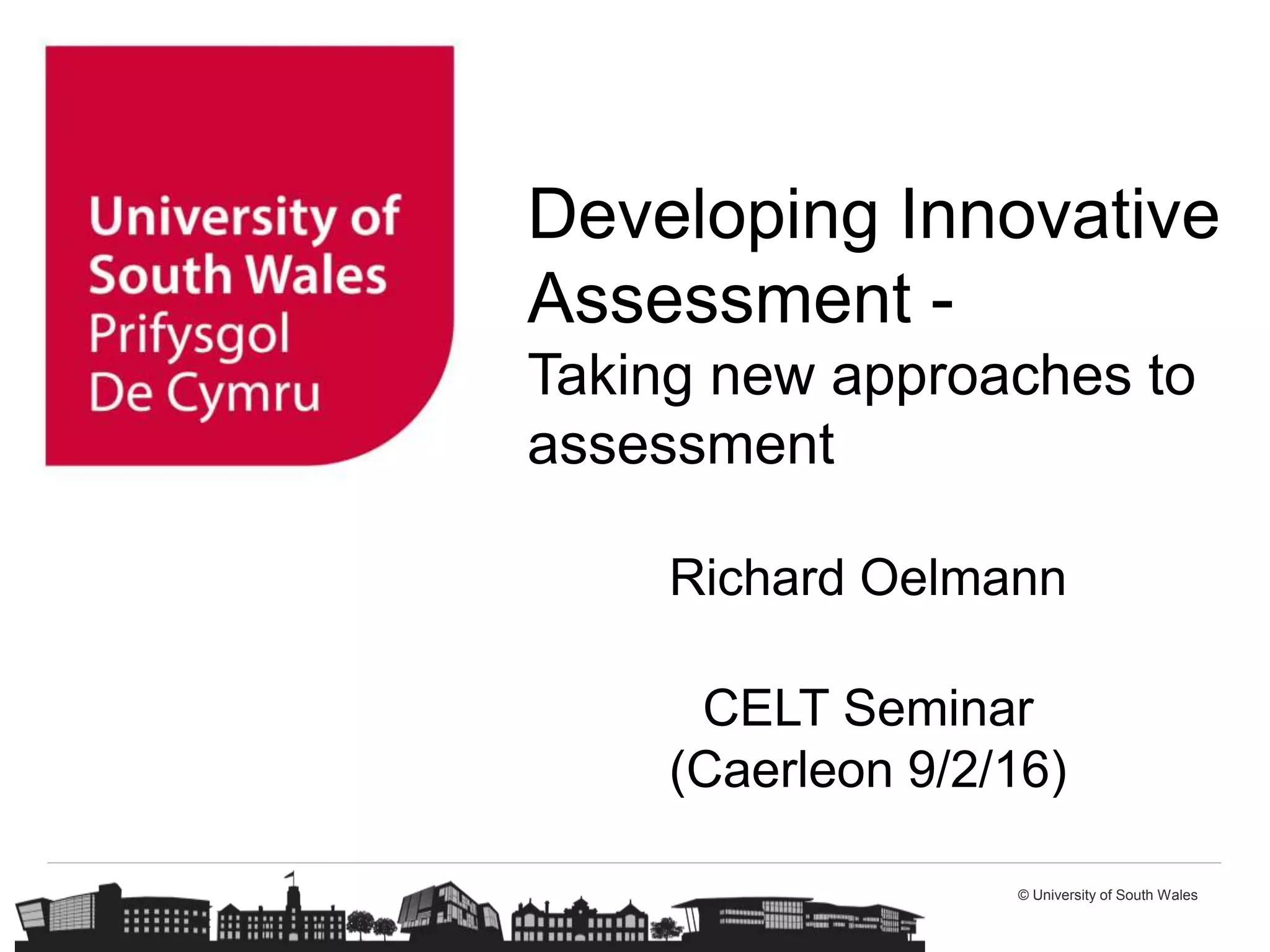
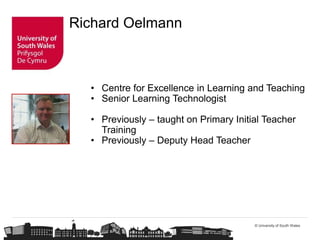
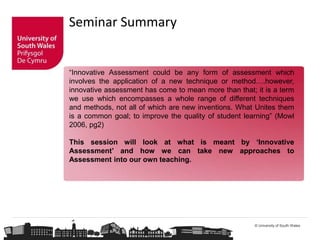
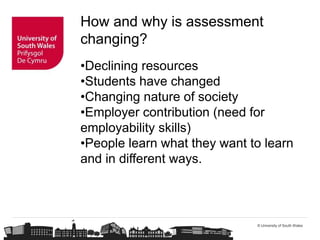
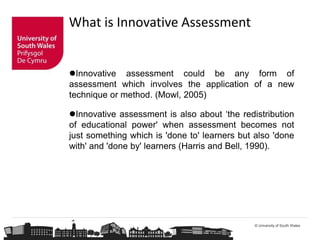
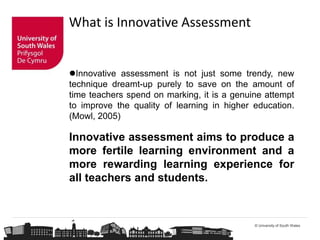
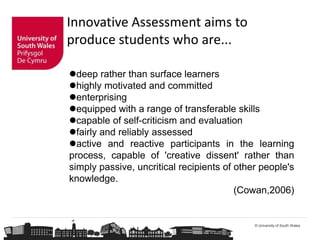
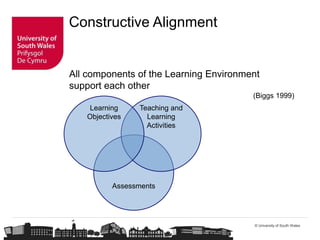
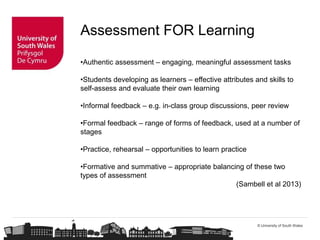
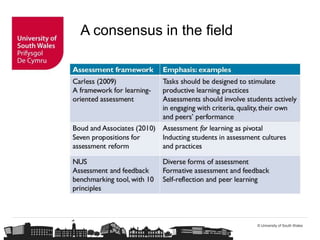
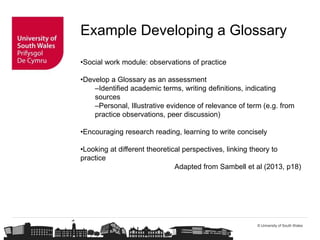
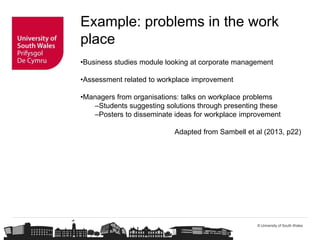
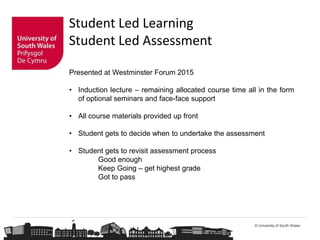
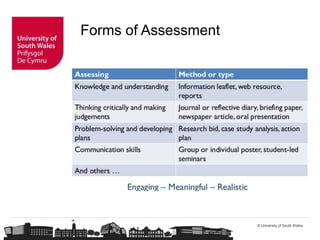
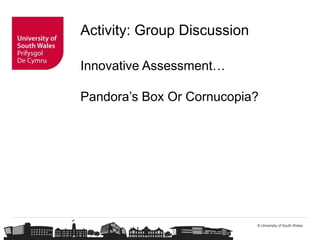
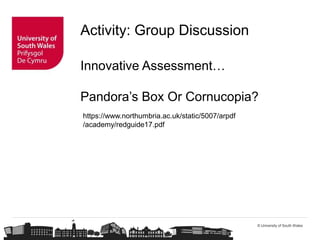
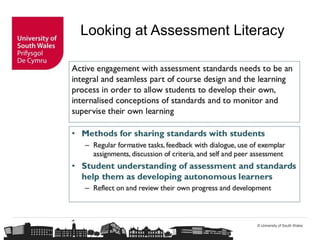
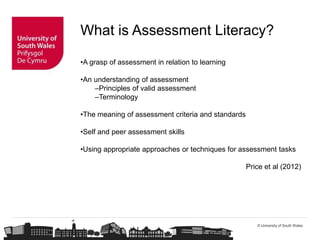
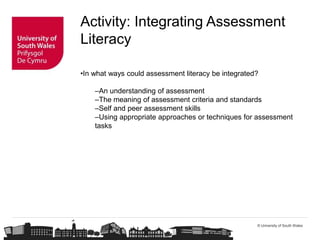
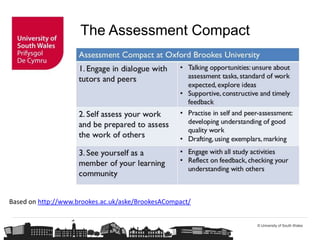
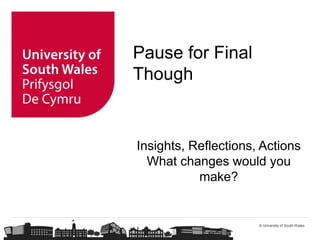
![© University of South Wales
Literally defined, innovative assessment could be any form of assessment which involves the application of a newtechnique or method. For us, however, innovative assessment has come to mean more than that; it
is a term we use which encompasses a whole range of different techniques and methods, not all of which are new inventions.
Innovative assessment is also about what Heron (1981) called ‘the redistribution of educational power’ when assessment becomes not just something which is ‘done to’ learners but also ‘done with’ and ‘done by’
learners (Harris and Bell, 1990).
For example, in any form of assessment it is usually beneficial for the learner to receive detailed feedback indicating their strengths and weaknesses in the area of assessed work and suggesting areas where
improvements or changes might be made in the future.
[[Grade only / Single feedback at end of module]]
Secondly, it aims to produce a more fertile learning environment and a more rewarding learning experience for all teachers and students.
Pandora’s Box?
10 common criticisms of innovative assessment, answered [[SEE REDGUIDE DOC FOR RESPONSES]]
1. Innovative assessment is just a ‘soft option’, simply less ‘rigorous’ than traditional forms of assessment. E.g. those people who can’t put
together a decent essay pick up marks just by giving a ten-minute talk or worse still, marking their own work.
2.Innovative assessment is too demanding, putting unreasonable pressure on some students. Somepeople would argue that whether you’re good at working in a group or not depends on ‘personality’ and that
those who are ‘loners’ or ‘shy’ won’t do well on group tasks – and it could be very stressful for them.
3. How can assessment be reliable if people other than the lecturers are involved in it? (e.g. employers, self/peer assessment)? Academics are,
after all, the experts aren’t they? Surely no student in their right mind is going to fail themselves?
4. Will innovative assessment work with increased student numbers? Is it more time consuming for staff?
5. Surely innovative assessment which is varied and requires lots of different things from students is too much of a burden for them – wouldn’t they prefer just to do an exam and get it over with?
6. If you give students too much help (formative feedback) – won’t you end up doing the work for them? Is this a fair test of their abilities?
7. The role of HE is to develop students’ academic abilities and critical thinking. Surely assessments which are based on their performance in a
workplace or skills they will need at work after graduating are just a distraction?
8. If there is too much assessment during a course, even if it is innovative, won’t students be overburdened with work and tend to take a surface
approach to their studies?
9. Why should students have so much choice in relation to assessment? Surely the lecturers know best what it is students need to learn in the subject
and they should have to be tested on that.
10. Is innovative assessment fair? Often it can’t be anonymous and marking is highly subjective: take the case of the black student barristers failing on video assessments although they passed the written tests.
Cornucopia?
8 possible benefits of innovative assessment
1. By incorporating a range of different methods innovative assessment assesses a broader range of skills and as such it is considered to be fairer and less discriminatory. Consequently, innovative assessment
should have the effect of widening access to Higher Education and perhaps widening success.
2. Innovative assessment is a more reliable assessment of student learning because it is not dependent on any one method of assessment. Innovative assessments allow for the fact that all individuals have
strengths and weaknesses, by assessing an individual’s performance across a range of skills a more balanced and reliable assessment can be obtained. Don’t put all your eggs in one basket!
3. Innovative assessment on the whole adopts a more positive approach to education; by spreading the assessment net more widely, it provides students with a range of opportunities to demonstrate how much
they understand (Ramsden, 1992), rather than the somewhat negative approach of how little.
4. Innovative assessment is usually formative and as such is more likely to facilitate effective, well motivated student learning. Providing timely and constructive feedback allows misunderstandings to be detected
and cleared up, and students are able to make improvements where necessary. This process helps maintain student motivation, enabling them to learn more steadily and fluently. If students genuinely don’t
know what they are doing wrong, as they are never informed, then this can lead to frustration and a loss of interest in the subject.
5. A range of different techniques and methods should stimulate both staff and student interest. Variety is the spice of life! [[MORE INFO REDGUIDE]]
6. Students learn and are assessed upon a much greater variety of skills and in a number of different situations. This should produce more rounded and more employable graduates. Assessments may include
students demonstrating that they ‘know how to’ rather than just ‘know about’ (Race, 1994).
7. Innovative assessment methods are usually more realistic and relevant, involving role plays, simulation and work placements; students develop a better understanding of how their specific skills and knowledge
can be applied both inside and outside the academic environment.
8. Innovative assessment is generally regarded as a possible strategy for facilitating a ‘deep’ rather than a ‘surface’ approach to learning (Marton and Säljö, 1990; Boyd and Cowan, 1985; Ramsden, 1992). Brown
and Dove (1993) consulted staff from four different universities who were already using self and peer assessments, the staff reported: “students using higher levels of reflection, developing a questioning and self
analytic approach to their professional practice and engaging in deep rather than surface learning” (Brown and Dove, 1993)](https://image.slidesharecdn.com/developinginnovativeassessment-160209085443/85/Developing-innovative-assessment-22-320.jpg)